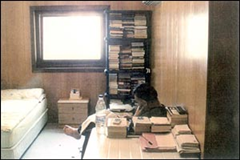 Who would have thought, in the eventful days that followed 15 February 1999 when the Kurdish leader Abdullah Ocalan was abducted from Kenya and taken to Turkey – with decisive contributions from CIA, MIT and MOSSAD as well as support from Russia, Greece and other European states – in violation of international law, that one day a Turkish prime minister like Recep Tayyip Erdogan would see himself forced to confirm that state authorities are conducting serious talks with “public enemy no. 1” about the settlement of the decades-old Turkish-Kurdish conflict.
Who would have thought, in the eventful days that followed 15 February 1999 when the Kurdish leader Abdullah Ocalan was abducted from Kenya and taken to Turkey – with decisive contributions from CIA, MIT and MOSSAD as well as support from Russia, Greece and other European states – in violation of international law, that one day a Turkish prime minister like Recep Tayyip Erdogan would see himself forced to confirm that state authorities are conducting serious talks with “public enemy no. 1” about the settlement of the decades-old Turkish-Kurdish conflict.
Öcalan ante portas! – The unity of the Turkish state is in danger, they said again and again, the authorities in Ankara left nothing unattempted to politically silence Abdullah Öcalan. Aggravated isolation conditions, repression against his lawyers or attacks on his physical integrity – despite all efforts of the state the internal perception unavoidably prevailed that, if at all, a solution is only possible with Öcalan and not against him. The Kurdish leader is not guiltless of that. He focussed on a settlement instead of confrontation; he persistently demanded dialogue. His vision of a solution to the Kurdish issue inside the established territorial borders of Turkey, by means of a radical democratic restructuring of the country, is not only attractive for Kurds.
As yet, nothing substantial from the talks has reached the public. But the positions of both sides are obvious. For the Turkish side, the challenge is to get the Kurdish guerrilla out of the mountains without really offering anything. Kurdish aspirations for emancipation should, if anything, be satisfied within a framework of individual rights. Demands for autonomy or further linguistic rights are rebuffed. The Kurdish side on the other hand regards a comprehensive change of the constitution which guarantees the cultural, linguistic and political rights of the Kurds, as the only assurance of a lasting solution. The reconciliation of the society should succeed through the establishment of human rights violations and war crimes with the help of truth commissions – similar to those in South Africa.
Obviously the positions of the conflicting parties are still very wide apart. But the taboo is broken – enemies became opponents which more or less prefer the word. The yearlong unilateral ceasefire of the Kurdish guerrilla accompanies the process of rapprochement.
Meanwhile, the role of the Islamic-conservative Party for Justice and Development (AKP) remains ambiguous. It does not seem to be interested in a real solution to the conflict. Of its much praised “Kurdish opening” little more remained than waste paper. But also in every other political issue it strives for an expansion of its power instead of making efforts for sustainable solutions. Its more and more autocratic governing style does not bode well for the future.
Still the human rights situation is disastrous, systematic torture widespread and extra-judicial killings in the Kurdish areas an established means of state repression. Again and again the police uses massive force – be it against trade unions, societal minorities or oppositional efforts – on the streets. Turkey manages to even leave Russia behind – for the time being no other country is convicted so often by the European Court for Human Rights in Strasbourg.
While in Turkey discontent about Erdogan’s autocratic style spreads, the western states pay court to him and his AKP. Startled by the Arabic awakening and the twilight of the dictators in the Arabic states, they praise Turkey as an exemplary alternative model for the compatibility of Islam and democracy. It makes no difference if that is conclusive with the reality in Turkey and the region. Human rights violations are relativised, the Kurdish issue not even mentioned and a prosperous economical growth praised while keeping silent about yearly multi-billion-dollar credits of the IMF. Trapped in a strategical wishful thinking, the western states try to replace one evil with another. The conservative religious forces in Turkey that eye the Iranian social order are delighted.
The targeted process of democratic change in Turkey, accompanied by civil-society initiatives, can only hope for little substantial foreign support. The same is valid for the Kurdish issue. Therefore a solution is only possible within Turkey.
The AKP’s attitude in this issue is obviously determined by delaying tactics. The silence of the weapons until the parliamentary elections in June 2011 suits it just fine, possible steps are postponed until after the elections. In contrast, Abdullah Öcalan raised the pressure: Without the establishing of a truth commission in Turkey’s national assembly he sees himself unable to play his role as a mediator between the Kurdistan Workers’ Party (PKK) and the Turkish state.
A possible peace process, however, requires his constructive impact, therefore he needs more room for manoeuvre.
It is for this reason that the International Initiative “Freedom for Abdullah Öcalan – Peace in Kurdistan” supports the demand for the transformation of the isolation imprisonment into a house arrest in which he will be able to participate more in the political process. The chance for peace must not be wasted – it needs the support of all forces that advocate a comprehensive democratic change in Turkey and the region. The dialogue has to continue – the only weapon that is constructive.
—
International Initiative
“Freedom for Abdullah Ocalan – Peace in Kurdistan”
P.O. Box 100511, D-50445 Cologne
Telephone: +49 221 130 15 59
Fax: +49 221 139 30 71
http://www.freedom-for-ocalan.com